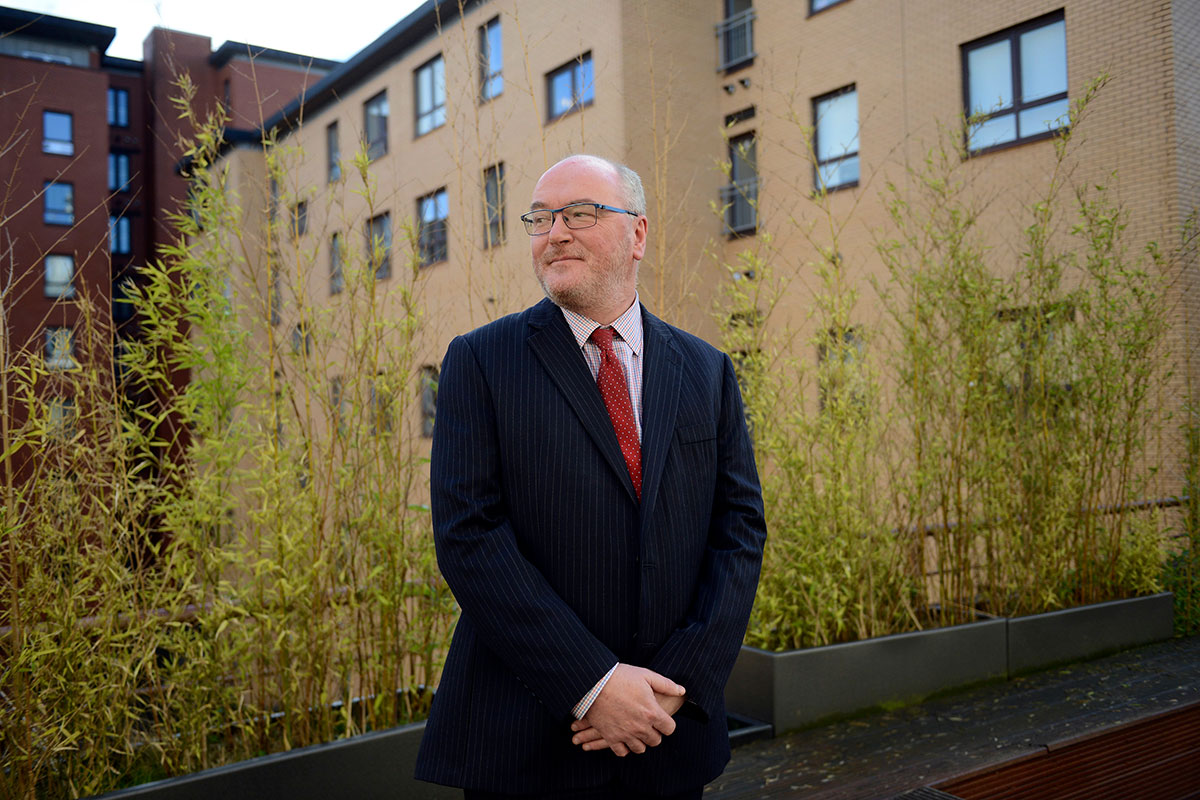Leading from the back: an interview with Martin Armstrong
As chief executive at Wheatley, Martin Armstrong is responsible for one of the largest portfolios of social housing in the UK. But, as Luke Barratt discovers, he is a reluctant figurehead. Photography by James Chapelard/SWNS
Wheatley Group is no ordinary social landlord.
With more than 80,000 homes under management, it is one of the biggest in the UK. But in Scotland, it stands on its own, with the second-largest, Dumfries & Galloway Housing Partnership, weighing in at just one-eighth of its size.
This makes Martin Armstrong no ordinary chief executive. And yet when it comes to the spotlight, he is surprisingly shy. Before agreeing to this interview with Inside Housing, he had met the press just twice while in post – in 2010 and 2013.
This year, he is celebrating a decade in charge of Wheatley. Is it an opportunity to look back on his time so far?
“There is a bit of reflection, obviously, when you come to any sort of milestone,” he says in his soft, Northern Irish brogue. “I thought it was important for people to hear our story, understand us and understand what’s been achieved.”
The achievements are indeed difficult to ignore. In 2009, Mr Armstrong took over Glasgow Housing Association (GHA), tasked with turning its fortunes around around after a costly, controversial, and soon-abandoned stock transfer programme left it facing a funding black hole and staff cuts.
Ten years later, he is running a much larger group of organisations which manage homes across Scotland through various subsidiaries, including the original GHA.
With Mr Armstrong five years into the job, Wheatley completed a £1.2bn stock modernisation programme. It then spent the next five years completing an expansion from almost 52,000 homes under management to its current size.
In a preview of the group’s plan for the next five years, Mr Armstrong reveals: “Our new strategy, which we’re launching early next year, clocks about another £1.2bn invested in existing stock and new build.”
Like the organisation he runs, Mr Armstrong’s office is impressively large, with three plush sofas and a set of glass doors opening onto a private roof terrace.
Size feels like a feature when it comes to Mr Armstrong. Both of his previous Inside Housing interviewers were so impressed by his own six-foot-three frame that they referenced it in their headlines – ‘Mr Big’ and ‘Standing tall’.
Being a big player brings its own set of challenges, of course. A common refrain in England is that the behemoths currently dominating the housing association sector have lost sight of their social purpose.
Mr Armstrong has some time for this argument. “It might not have been a conscious movement,” he accepts. “It might have been a response to very different business models emerging.”
He does not, however, see this as a necessary consequence of growth and tells Inside Housing that he thinks Wheatley has retained its local connections.
Mr Armstrong’s interest in the granular details of Wheatley’s residents may stem from his background. As the conversation turns towards his personal history, though, he grows noticeably uncomfortable, showing again that aversion to the spotlight.
Nevertheless, after pressing from Inside Housing, he reveals: “I’m from Derry. Print that either way.”
His father, he explains, was a former farmer who moved to the city with his mother shortly after he, the youngest of four, was born. They clearly share his privacy. According to Mr Armstrong, they would be “mortified” to be mentioned in this article in any more detail.
Growing up, he supported Leeds United out of a love for the Irish midfielder Johnny Giles. Asked about this, he pauses with a slightly frustrated smile at having to talk about himself again.
“There were three teams in Ireland you could support: Liverpool, Manchester United or Leeds United,” he remembers. “So I picked Leeds United. My brother is also a Leeds United supporter, as is his son, as is my son.
“I’ve supported Leeds all my life. My first job was at Kirklees Council because it was the closest I could get to Leeds. I thought, if I’m going to move away from home, I might as well go where there’s an interest at least.”
“[Universal Credit] is the most odious piece of policy ever invented by a government”
Mr Armstrong went to Kirklees, which contains Huddersfield, straight after graduating from his housing degree. There, he worked as an estate management officer on the Brackenhall Estate.
He remembers it fondly, calling it a “formative part of my career”.
The estate was made infamous in 1992 after an extended skirmish between around 200 young residents and police, who were accused of using excessive violence during a drugs raid.
“It was an area that went through a very tough time,” Mr Armstrong recalls. “It had its own culture, it had its own sense of identity within the estate. There were some fantastic things going on in that area. It was a really good place to start – having a sense of the impact of social deprivation, irrespective of what the physical fabric looks like.
“It was probably the first place I made that connection. Being a student in housing I had a sense of the physical aspects being the most important: you know, a good house, affordable rents and that’s problem solved.
“I learned very quickly on that estate that that’s part of the conversation but it’s not all of the conversation.”
It was here, he said, that he learned the importance of changing “people’s expectations of themselves” in order to help them change their lives for the better.
After a brief spell on the Woodfield Estate in Dundee, Mr Armstrong headed south to become senior estate manager of two large estates in Kingston upon Thames.
Here, he said, residents faced “different challenges”, but again presented him with “an opportunity to understand behaviours of people”.
These experiences, perhaps, explain why Mr Armstrong has been so keen to keep Wheatley focused on its local presence and why he has allowed the group’s various subsidiaries to retain their original identities, boards and executive teams.
This principle was also at play in 2011 when he decided to reduce Wheatley’s housing officer patches, ensuring that across its stock it has one housing officer to every 200 homes.
“We did that to get closer to our customers,” Mr Armstrong explains. “We felt that was a very important part of our raison d’être.”
This has involved utilising one of Scotland’s favourite concepts – devolution – within Wheatley itself, through the association’s ‘Think Yes’ policy, which allows frontline housing officers more power to solve the specific issues faced by tenants by figuring out how to say ‘yes’ to their needs.
Mr Armstrong remarks: “We have leaders at every level. That’s hugely important, building the capacity for the organisation to have really strong leaders.”
This delegation of leadership also applies to Wheatley’s tenants. The group has a ‘Participatory Budgeting’ policy, which means that portions of the group’s budget are made available to committees of tenants around Scotland each year to spend as they see fit.
A majority of the board is also made up of tenants, something Mr Armstrong is keen to emphasise.
The idea that Wheatley is not a top-heavy organisation is further demonstrated by a story Graham Isdale, its director of corporate affairs, tells Inside Housing as he sits alongside the boss during our interview.
Describing how GHA won an award for business excellence in 2017, he recalls: “On the stage is Bernadette [Hewitt], the GHA chair, standing in the middle receiving the global business excellence award. On the other side, we had the Dubai Electricity and Water Authority – all of these sharp businessmen in very expensive Armani suits.
“On the other side, we had executives from Bosch, the global manufacturing company.
“We had the mother of five children from Glasgow, who was there as the tenant chair of GHA to pick up that same accreditation.”
Notably, it wasn’t Mr Armstrong up on stage, the chief executive again choosing to shun the limelight. But however much he might claim to want to avoid it, surely Mr Armstrong’s prominence means he inevitably becomes a figurehead?
“I wouldn’t call myself a figurehead,” he responds carefully, but admits that Wheatley’s size helps it to influence conversations around policy.
For example, Alastair MacNish, his group chair, has written to Amber Rudd, work and pensions secretary, in a letter seen by Inside Housing, over Universal Credit. In the letter, Mr MacNish urges a range of reforms to the new benefits system, warning of the potential consequences on the vulnerable tenants of Scotland.
When he talks about Universal Credit, Mr Armstrong speaks with real anger, wagging his finger and tapping his foot in agitation.
“It is the most odious piece of public policy ever invented by a government,” he intones. “It will strike at the heart of our communities. We’re seeing it now being rolled out across all our [subsidiaries] and it’s even worse than we anticipated.”
Unlike previous benefits systems, Universal Credit requires claimants to wait at least five weeks before receiving their first payments, meaning they must often survive for this period with no income at all.
Mr Armstrong says: “It’s built on some fundamental flaws. It’s built on the principle of work. It’s to get people used to the principle of work, which I understand. I get that. But when you work a month, you get paid from the day you start. When you apply for Universal Credit, you only get it from the date the process is complete.
“We have leaders at every level. That’s hugely important, building the capacity for the organisation to have strong leaders”
“So it’s almost like expecting people who work to work for free for a month and feed themselves, and then only start getting paid on the second month.”
He also notes that getting people into work, in today’s economy, is not the sure-fire route out of poverty that the government claims it is. According to the most recent statistics, three in four children in poverty have a working parent.
Although the government has largely remained committed to its Universal Credit plans, Mr Armstrong believes Wheatley has had some influence on “the timings” around the system.
But in Scotland, they’re used to dealing with the negative impacts of policies cooked up in Westminster. The latest example of this has been Brexit, which Scottish people voted against by 62% to 38%.
Like most in the sector, Mr Armstrong still doesn’t quite know what to make of the situation. The eventual outcome is, of course, still shrouded in political uncertainty and the best housing associations can do is prepare for all eventualities. At Wheatley, they have applied the Bank of England’s various scenarios to their business plan, Mr Armstrong says.
These outline different post-Brexit possibilities. The worst scenario, a ‘disorderly Brexit’, could see house prices fall by up to 33% and inflation peak at 6.5%, the bank has said.
“We’ve made it worse,” Mr Armstrong adds. “We’ve made some worse assumptions on the back of that, to see if our business plan is robust. Housing construction in Scotland consumes more timber than south of the border because of our weather and so forth. A total of 82% of that comes from Europe.
“So we’ve added some factors in on the back of it. And it stands the test. It stands the robustness of it.”
In such uncertain times, and taking into account Wheatley’s ambitious investment plans, at some point Mr Armstrong might have to abandon his reluctance to adopt a more visible role.
For now, though, expect him to maintain his image as the director in the shadows.













